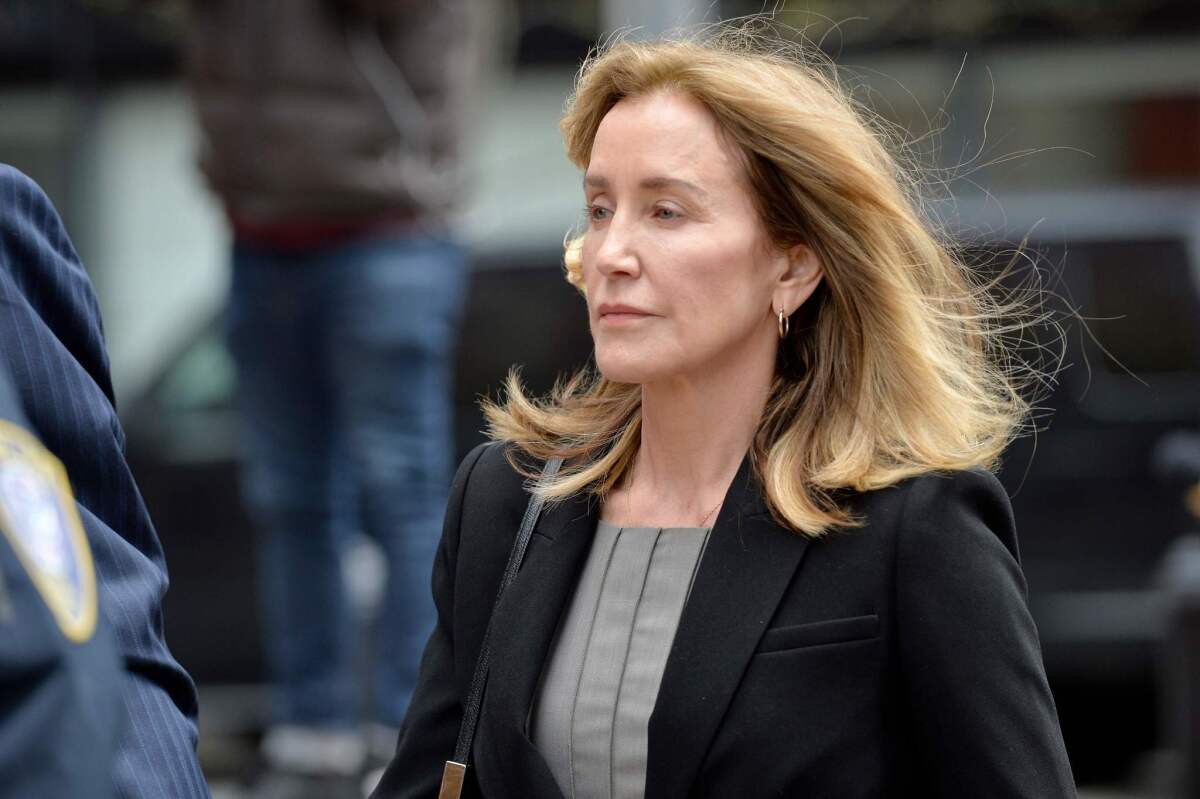Felicity Huffman pleads guilty in college admissions scandal

Felicity Huffman pleaded guilty in a Boston courtroom Monday to a fraud conspiracy charge for her role in a brazen test-fixing and bribery scheme that has sent the actress’ reputation and career prospects tumbling.
Huffman, 56, admitted to paying $15,000 to William “Rick” Singer, a Newport Beach college admissions consultant, to inflate her daughter’s SAT score. She will be sentenced Sept. 13.
Prosecutors have recommended a sentence at the low end of guidelines that call for four to 10 months in prison, according to Huffman’s plea deal and federal sentencing guidelines. She will also pay a $20,000 fine.
But Huffman’s attorneys said in her plea agreement that they would reserve the right to argue that her sentence should be calculated at a slightly lower range than what prosecutors have proposed. If they make that argument and are successful, Huffman could face a sentence of no time at all to six months in prison, according to federal sentencing guidelines.
Judges are not required, however, to abide by sentencing recommendations from prosecutors. In pleading guilty, Huffman gave up the right to challenge her conviction and her sentence, whatever it may be.
RELATED: Felicity Huffman likely to face some prison time in college admissions scandal »
Devin Sloane, a Los Angeles resident and executive of a water systems company, also pleaded guilty Monday in Boston to a fraud conspiracy charge. Because Sloane paid far more than Huffman to participate in Singer’s scheme, prosecutors have recommended he spend a year in prison and pay a $75,000 fine.
Sloane, 53, will be sentenced Sept. 10.
Sloane and Huffman join three other parents who have pleaded guilty so far in the scheme. Thirty-three parents have been charged in the wide-ranging case.
In a mea culpa a month earlier, Huffman said she would not contest the government’s allegations and apologized to the public and her friends, family and daughter, who Huffman said knew nothing of the test-fixing scheme.
Singer told investigators he went to Huffman’s home in 2017 and explained to the actress and her husband, actor William H. Macy, how the scheme worked. Singer told the couple he “controlled” a private school in West Hollywood, where Huffman’s daughter would take the exam; he explained that an accomplice, 36-year-old Mark Riddell, would proctor the exam and correct their daughter’s answers after she finished the test.
Huffman and Macy agreed to it, according to a FBI affidavit filed in federal court.
Key to the scheme, prosecutors say, was securing extra time for Huffman’s daughter on the SAT because of a learning disability, which would allow Riddell to proctor the exam at a school of Singer’s choosing. In October 2017, Huffman learned her daughter got the extra-time designation. She emailed Singer: “Hurray!”
The following day, when a counselor at her daughter’s school told Huffman she would have to take the test at her own school, the actress emailed Singer again: “Ruh Ro!”
Singer intervened. With Huffman’s help, he explained that the girl was taking the test elsewhere and on a weekend because she didn’t want to miss a school day.
Eventually, she was cleared to take the SAT at a private school in West Hollywood. Prosecutors allege Singer was paying an administrator at the school, Igor Dvorskiy, thousands of dollars to turn a blind eye to the cheating. Dvorskiy has been indicted on a racketeering conspiracy charge. He has pleaded not guilty.
Huffman’s daughter took the SAT in December 2017. Once she was done, Riddell, whose day job was leading college entrance exam preparation at IMG Academy in Florida, corrected her answers.
The girl scored 400 points higher than when she took the preliminary SAT a year earlier, prosecutors said.
With tears spilling down her face, Huffman said Monday that the government’s allegations were true but insisted her daughter was diagnosed years earlier with a legitimate learning disability that made her eligible for extra time on tests. Her daughter’s psychologist took no part in the scheme, Huffman said in court.
Two months after her daughter took the SAT, Huffman and Macy paid $15,000 to Singer’s foundation. The Key Worldwide Foundation, whose purported mission was to help “underserved children” pursue an education, has since been exposed as Singer’s vehicle for laundering payments from parents and paying bribes to college coaches, administrators and exam proctors.
Riddell has pleaded guilty to fraud conspiracy and money laundering conspiracy; he will be sentenced in July. Singer has pleaded guilty to four felonies and admitted to masterminding the scheme; he will be sentenced in September.
For reasons that remain unclear, Macy has not been charged. Huffman was accompanied to court Monday by her brother, Moore Huffman Jr.
In October, Huffman and Macy told Singer they wanted to have their younger daughter’s SAT rigged as well, according to the FBI affidavit. The girl was “so academically driven,” Huffman told Singer over the phone, but they didn’t want to take chances.
“We’re talking about Georgetown,” Macy told him. The couple didn’t know it, but by then, Singer had been apprehended by the FBI. He was cooperating, and had allowed agents to record the conversation with Huffman and Macy.
For a school of that caliber — Georgetown’s acceptance rate that year was below 15% — Singer told Huffman and Macy their daughter would need to score in the mid-1400s to 1500 on her SAT “to be solid.”
Singer told them he could fix it like “the last time we did this” and send an invoice for $15,000 afterward.
“Are we all OK with the financial side and the actual operational side of it?” he asked.
“Cool,” Macy said, according to transcripts quoted in the affidavit.
Ultimately, Huffman and Macy did not end up going through with the test-fixing scheme for their younger daughter, prosecutors say. They have not said why.
Sloane, the water systems executive, paid Singer and an alleged accomplice $250,000 to ensure that Sloane’s son, who attended the Buckley School in Sherman Oaks, was admitted to USC as a recruited water polo player.
In court documents littered with brazen examples of Singer’s handiwork, the plan he and Sloane concocted was particularly barefaced: Sloane purchased a water polo cap and ball on Amazon in June 2017, according to an FBI affidavit filed in federal court and, after taking pictures of his son wearing the gear, enlisted the help of a graphic designer to Photoshop his son’s face and torso onto an image of a genuine water polo match.
With the doctored photo and a recruiting profile that falsely said Sloane’s son played for the “Italian Junior National Team” and “LA Water Polo” team, the boy was admitted to USC in March 2018. In truth, Sloane’s son did not play water polo and his high school did not field a team, prosecutors say.
When a counselor at the Buckley School questioned how he had been recruited as a water polo player, Sloane fumed, telling Singer in an email that “the more I think about this, it is outrageous! They have no business or legal right considering all the student privacy issues to be calling and challenging/question [my son]’s application!”
Prosecutors say Donna Heinel, a former administrator in USC’s athletics department, smoothed over the flap by writing to USC’s director of admissions, saying falsely that Sloane’s son played water polo in Europe and that his stature belied his strength and speed in the water.
“He is small but he has a long torso but short strong legs plus he is fast which helps him win the draws to start play after goals are scored,” she wrote in an email, according to the FBI affidavit.
Heinel has been indicted on a racketeering conspiracy charge; she has pleaded not guilty.
Reporting from the Associated Press was included in this article.
More to Read
Sign up for Essential California
The most important California stories and recommendations in your inbox every morning.
You may occasionally receive promotional content from the Los Angeles Times.










